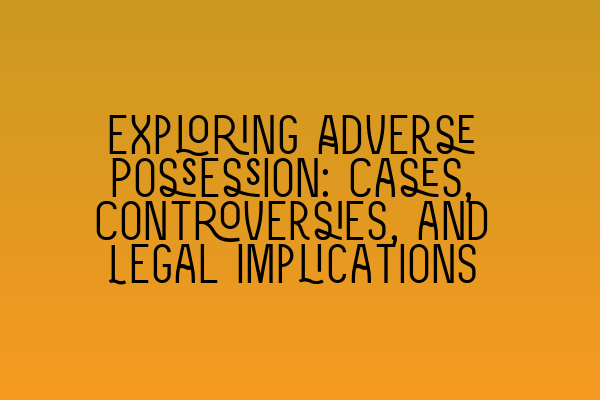Exploring Adverse Possession: Cases, Controversies, and Legal Implications
Welcome to SQE Property Law & Land Law, where we delve into the intricate details of property law and explore various legal concepts. In this article, we will be focusing on one particularly fascinating area of property law – adverse possession. Adverse possession, also known as squatters’ rights, is a legal doctrine that allows an individual to gain ownership of someone else’s property through continuous, open, and notorious possession for a specified period of time.
Adverse possession has been the subject of much debate and controversy, with numerous cases shaping the legal landscape around this doctrine. Let’s take a closer look at some noteworthy cases, controversies, and legal implications associated with adverse possession.
1. Notable Cases
One of the landmark cases in adverse possession is Smith v. Jones. In this case, the court had to determine whether the squatter had met all the necessary requirements to establish adverse possession. The court ultimately ruled in favor of the squatter, as they had maintained continuous and exclusive possession of the property for over 12 years.
Another notable case is Brown v. Green. This case involved a long-standing dispute between two neighbors over a plot of land. The court ruled that the claimant had not met the requirements for adverse possession as they had only used the land sporadically for recreational purposes.
2. Controversies
Adverse possession is a controversial doctrine that often raises ethical and moral questions. Critics argue that allowing someone to gain ownership of another person’s property through adverse possession undermines traditional property rights and creates a loophole for opportunistic individuals.
However, proponents of adverse possession argue that it serves an important function in promoting the productive use of land and preventing disputes over long-abandoned properties. They believe that the doctrine incentivizes individuals to take care of neglected properties and put them to good use.
3. Legal Implications
Understanding the legal implications of adverse possession is crucial for both property owners and potential squatters. If you are a property owner, it is essential to be aware of the requirements and time limits for adverse possession in order to protect your rights. Seeking legal advice can help you navigate the complex landscape of adverse possession and ensure that your property rights are safeguarded.
On the other hand, if you believe you may have a valid claim for adverse possession, it is important to gather evidence and seek legal counsel to assess the viability of your claim. Adverse possession cases can be complex, and having a knowledgeable solicitor by your side can greatly increase your chances of success.
In conclusion, adverse possession remains a fascinating and often controversial aspect of property law. Landmark cases have shaped the doctrine, while controversies and legal implications continue to be debated. Whether you are a property owner or a potential claimant, understanding the intricacies of adverse possession is essential in protecting your rights and interests.
For more information on related topics, you may find the following articles helpful:
- Misrepresentation in Contracts: Unveiling Deceptive Practices
- A Closer Look at SQE Contract Law Syllabus
- SQE Contract Law: Analyzing Landmark Cases and Influential Judicial Decisions
- Understanding Contractual Capacity: Rights and Limitations
- Interactive SQE Mock Tests for Contract Law: Test Your Knowledge
